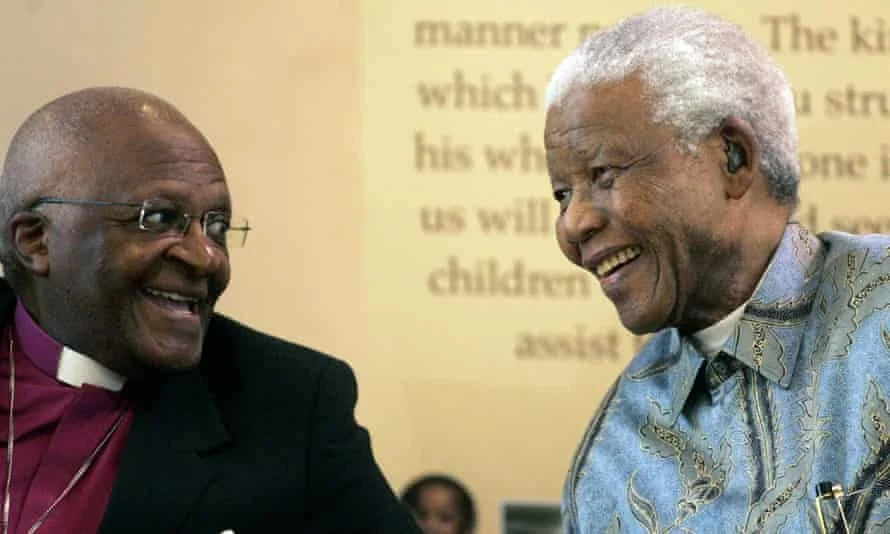Farewell to Hero Tutu
The Nobel laureate and South Africa’s moral conscience dies on Boxing Day in Cape Town aged 90
by Jaka Bizilj
Archbishop Desmond Tutu speaks to the power of saying ‘‘I’m Sorry’’
CAPETOWN - When he stormed our cinema in a yellow Bafana-Bafana football jersey in 2010 and walked down the stars from the back of the auditorium like a superstar, Bishop Tutu was so full of energy, that nobody would have assumed it was one of his last international public appearances, that cancer had taken such a toll. Since yesterday he is dead.
Bishop Tutu loved to tell jokes. This was one of his favourite ones: during the struggle to end Apartheid he drove a boat together with South Africas White President de Klerk, whose hat was blown by the wind onto the lake. "I walked over water to give him back his hat. Next day, the newspapers wrote: Bishop Tutu can`t swim!" Tutu burst out with laughter and every listener with him - I have never seen andybody with such an infectious laughter, winning any audience in seconds, even his "opponents". Maybe this was one of the reasons why there were no revenge kilings after his Truth & Reconcilliation commission exposed incredible crimes of the Apartheid regime.
Tutu united South Africa, Nelson Mandela called him "the conscience of South Africa".
I met Tutu on a few occasions, he was one of maybe 5 people in the world who could cast an immediate spell on everybody he talked to, like a biblic "fisher of men", in one league with his friend Mandela, Shimon Peres and Bill Clinton. At Clinton`s Global Initiative in New York he turned a "saturated" room of half-a-sleep head of states and dignitaries into enthusiastic fans by breaking down complex matters into inspiring simple words and having world leaders laugh and tackle world problems with humour.
I had given President Clinton a pledge to host with Cinema for Peace school screenings across South Africa of the film THEMBA to protect the youth from Aids. In order to kick off the screening campaign with publicity and have many schools join, we hosted in Capetown a premiere just before the Football World Cup 2010 with Bishop Tutu. In his Bafana-Bafana national team jersey he kicked footballs into the audiences, putting some 200 kids into a frenzy. What a difference to President-elect Jacob Zuma at a Sports for Peace-occasion in Johannesburg: While I reminded Zuma of protocoll to no avail and had to greet instead of him UN Secretary General Ban Ki-moon at arrival at the World Cup in South Africa, Tutu didn`t need to be told or be given an agenda - he was the agenda, he was the master of ceremonies and took control of all action and all attention.
But Tutu was never only a showman, his entertainment was based on substance and humanity - and his sense for responsibility. He started our THEMBA school screenings-campaign together with the Premier of the Western Cape, Helen Zille, who had exposed during the Apartheid-regime as a journalist the killing of Steve Biko, which became after her exposure, the film by Sir Attenborough "Cry Freedom" and Peter Gabriel`s song "Biko" a symbol of the global fight against Apartheid in South Africa.
THEMBA tells a story of a boy who contracts a HIV-infection through rape, but stays determined to become a professional soccer player. After he achieves his dream to make it into the junior national team of South Africa he breaks the dogma of shame and denial at his first press conference, saying that Aids is nothing to be ashamed of and that it can be overvcome with medical treatment. A girl sent us a letter after a screening:
"I wish she had told me she had HIV. I wanted to tell her that I loved her, that I did not care if she had HIV. […] Please let other children see this film. Please let people like my mother see this film.” - Zanele, age 17, Mbekweni Community, Paarl
There have been many cases where Tutu inspired change and helped to save lives. In 2015, he launched a petition urging global leaders to create a world run on renewable energies within 35 years, which was backed by more than 300,000 people globally. It described climate change as “one of the greatest moral challenges of our time”.
Desmond Tutu and Nelson Mandela together in 2008.
Photograph: Themba Hadebe/AP
Nelson Mandela, who spent his first night in freedom in Bishop Tutus house, said about his friend: "With his words and courage he inspired our nation and has inspired hope in the darkest of times."
Friends will remember Tutu as a man of deep faith whose charm, warmth and intelligence few could resist, and who was happiest when active on behalf of others. Tutu: “I love to be loved.”
Cry Freedom Trailer
Cry Freedom is a 1987 feature film directed by Richard Attenborough, set in the late 1970s, during the apartheid era of South Africa
THEMBA: A Boy Called Hope Trailer
THEMBA (meaning hope) tells the story of a young South African boy who realizes his dream of playing for the national soccer team but must come to terms with AIDS that has infected both his mother and himself.
Peter Gabriel performs "Biko" live at the River Plate Stadium in Buenos Aires, Argentina on the final night of the ‘Amnesty International Human Rights Now’ tour (October 15, 1988).

